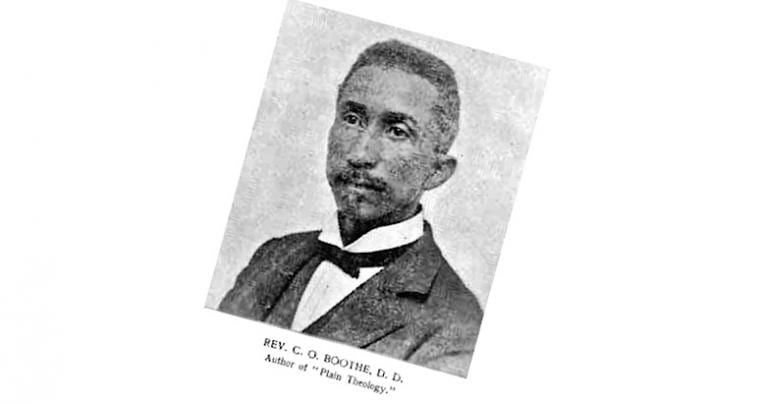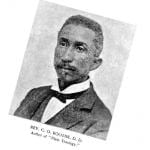 Charles Octavius Boothe lived at a moment in American history where living as a Christian should live meant persecution. If he sought justice and loved mercy, he might be murdered by terrorist organizations. Despite this, Reverend Boothe lived an active Christian life seeking what he called “uplift” for African-Americans coming out of slavery into a world of Jim Crow.
Charles Octavius Boothe lived at a moment in American history where living as a Christian should live meant persecution. If he sought justice and loved mercy, he might be murdered by terrorist organizations. Despite this, Reverend Boothe lived an active Christian life seeking what he called “uplift” for African-Americans coming out of slavery into a world of Jim Crow.
His Plain Theology for Plain People is directed at the hundreds of thousands of African-Americans looking for an education in the Christian faith. As a work of theology, a forerunner to the best of Evangelical thought, it rivals R.A. Torrey for clarity and demonstrates a vital root to the growth of traditional, Bible centered forms of Protestantism as opposed to theological liberalism coming into favor in many seminaries.
Combining concision and passion is hard to do, but Boothe does this while using an apologetic style in most sections that is very appealing. He often will present an idea, objections, and then respond. While his particular expression of Christianity is not one I share, there was much to learn from Boothe both as an American Christian and as a mere Christian!
Boothe turns from God, creation, and redemption:
We now come to ask what his people are to do day by day so long as they live in this world.
The former enslaved man does not hesitate to say:
This means that they do not want to be their own, but really desire to belong now and forever to Christ; that they are glad to take him for their Lord and Master, and are ready to spend and be spent in his service. The faithful servant will, of course, be found asking day by day, “Lord, what wilt thou have me to do?” He should always remember that he will most glorify God by doing promptly, diligently, and faithfully what God wants him to do.
This is powerful and undercuts the notion that slavery could endure in a consistent Christian nation. A Christian is Christ’s and cannot owe the total allegiance of a servant to any other state, person, or ideology. We serve the good, true, beautiful God who can be trusted as He created us and liberates us.
We express this service to Christ alone first in baptism. Boothe makes a strong case of the obedience to Christ by baptism through immersion in water. This is doing “just exactly what he tells us.”
Second, Boothe points the believer to Christian fellowship. It is “both needful and natural for believers to unite themselves in churches. They are of one family, of one mind, of one spirit, of one hope.” We express our unity in one cup, the Lord’s Supper.
The believers act to “edify one another:”
… upon “every one of us”—that is, on all the members of “the body of Christ,” Christ has conferred some gift that is profitable for the building up of the church. This is his “house.”
Boothe repeats several times that everyone, each Christian, has a role and gift in building up God’s house:
Let every one keep fixed in mind the thought, “I am called by the blessed Jesus to help in building up his glorious house,” and seek daily grace and help, so that he may build wisely and rapidly!
This should have undercut Jim Crow and segregation in the lives of any church consistently living out plain theology. Of course, this social justice would have just been an outer sign of inner sanctification, holiness, that Boothe knows is the final aim of a lived faith. While the outside may be clean and the inside rotten, few times is the outside wicked and the inside sanctified. The failure of unity and peace in our gatherings reflects our lack of the Holy Spirit.
Boothe knows that out of this unity we must “seek and save the lost.” We will share what we live and know when we can. The Christian is missional, spreading the good news globally, and supporting this message with his prayers and money, if not his entire life.
All of our witness must spring from “a pure and spotless Christian life.” Who can deny that failure to do as Boothe shows us the Bible teaches continues to mar our testimony? He turns to the Sermon on the Mount first as the source of a holy or pure Christian life. He points to charity, meekness, mercy, purity, peacemaking as the signs of sanctity.
The Christian life is love. We love God and the love of God, if real, makes hatred of our brothers and sisters impossible. Why is the church powerless? We fail to love. Boothe ends with words for his time and for now:
What a power the believers in Christ will be in this world, where such multitudes are hateful and hating one another, when they all come to abound in deep, pure, fervent love to God and to their neighbors! How they will be stimulated to labor and give and pray for the gathering of every creature in the world into the fold of Christ, when they love God the Father, the Son, and the Holy Spirit, “with all their heart, and soul, and might, and mind, and strength,” and really and truly love their neighbor as themselves! An increase of such love will be accompanied by a vast increase of missionary zeal and enterprise; and not long would it be before there will be, “Great voices in heaven, saying, The kingdoms of this world have become the kingdoms of our Lord and of his Christ; and he shall reign for ever and ever” (Revelation 11:15).
——————————————————–
Boothe, Charles Octavius. Plain Theology for Plain People (Lexham Classics) . Lexham Press. Kindle Edition.











